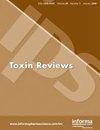Effect of bacterial toxin identified from the Bacillus subtilis against the Cnaphalocrocis medinalis Guenée (Lepidoptera: Crambidae)
IF 2.4
4区 医学
Q2 TOXICOLOGY
引用次数: 4
Abstract
Abstract In recent times, controlling agricultural diseases and pests using chemical pesticides is broadly applied and is considered effective but it is not considered as eco-friendly. For pest control, biological ways have been considered sustainable and safe. As bio-control agents, the Bacillus species exhibit a large spectrum of biological activity. The application of Bacillus subtilis as a potential bio-control agent against the lepidopteran pest, the rice leaffolder, Cnaphalocrocis medinalis is the focus of our study. The strain B. subtilis-MW365355 was identified by morphological, biochemical, and genetic analyses. Under laboratory conditions, cell suspensions of B. subtilis (Bs) were added to an artificial diet, fed to C. medinalis and the effects of the bacterial ingestion were evaluated by measuring the feeding, growth, food utilization and behavioral response of C. medinalis. An effect of B. subtilis in the artificial diet was evaluated with the different spore concentrations of 3.2 × 105, 6.3 × 105, 1.5 × 107 and 4.1 × 107 CFU/ml. The larvae fed with the B. subtilis amended diet had a significantly reduced growth efficiency compared to the control group fed with a bacteria-free diet. In conclusion of our study, B. subtilis (Bs) will significantly contribute to the management of leaffolder disease in the future.枯草芽孢杆菌细菌毒素对稻纵卷叶螟的防治作用
摘要近年来,化学农药被广泛应用于农业病虫害防治,被认为是有效的,但却不被认为是环保的。对于害虫控制,生物方法被认为是可持续和安全的。作为生物防治剂,芽孢杆菌具有广泛的生物活性。枯草芽孢杆菌作为一种潜在的防治鳞翅目害虫、稻纵卷叶螟的生物防治剂是本研究的重点。通过形态学、生化和遗传分析鉴定了枯草芽孢杆菌- mw365355。在实验室条件下,将枯草芽孢杆菌(B. subtilis, Bs)细胞悬浮液添加到人工饲料中,喂给稻纵梭菌,通过测定稻纵梭菌的摄食、生长、食物利用和行为反应来评价细菌摄食的效果。以3.2 × 105、6.3 × 105、1.5 × 107和4.1 × 107 CFU/ml的芽孢浓度对人工饲料中枯草芽孢杆菌的效果进行了评价。饲喂枯草芽孢杆菌添加饲料的幼虫的生长效率显著低于饲喂无细菌饲料的对照组。在我们的研究中,枯草芽孢杆菌(Bs)将在未来的落叶病管理中发挥重要作用。
本文章由计算机程序翻译,如有差异,请以英文原文为准。
求助全文
约1分钟内获得全文
求助全文
来源期刊

Toxin Reviews
医学-毒理学
CiteScore
6.80
自引率
0.00%
发文量
36
审稿时长
>12 weeks
期刊介绍:
Toxin Reviews provides an international forum for publishing state-of-the-art reviews and guest-edited single topic special issues covering the multidisciplinary research in the area of toxins derived from animals, plants and microorganisms. Our aim is to publish reviews that are of broad interest and importance to the toxinology as well as other life science communities. Toxin Reviews aims to encourage scientists to highlight the contribution of toxins as research tools in deciphering molecular and cellular mechanisms, and as prototypes of therapeutic agents. Reviews should emphasize the role of toxins in enhancing our fundamental understanding of life sciences, protein chemistry, structural biology, pharmacology, clinical toxinology and evolution. Prominence will be given to reviews that propose new ideas or approaches and further the knowledge of toxinology.
 求助内容:
求助内容: 应助结果提醒方式:
应助结果提醒方式:


